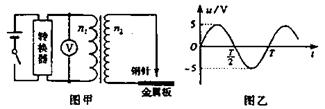问题
选择题
图甲是某燃气炉点火装置的原理图。转换器将直流电压转换为图乙所示的正弦交变电压,并加在一理想变压器的原线圈上,变压器原、副线圈的匝数分别为 、
、 。V为交流电压表。当变压器副线圈电压的瞬时值大于2500V时,就会在钢针和金属板间引发电火花进而点燃气体。以下判断正确的是
。V为交流电压表。当变压器副线圈电压的瞬时值大于2500V时,就会在钢针和金属板间引发电火花进而点燃气体。以下判断正确的是

A.电压表的示数等于5V
B.电压表的示数等于
C.实现点火的条件是


D.实现点火的条件是
答案
BD
题目分析:由图乙可知变压器初级电压最大值为5V,则有效值为 ,即电压表的示数等于
,即电压表的示数等于 ;要想点火则变压器次级电压要达到2500V,根据
;要想点火则变压器次级电压要达到2500V,根据 ,解得
,解得 ,所以实现点火的条件是
,所以实现点火的条件是
选项BD正确。
